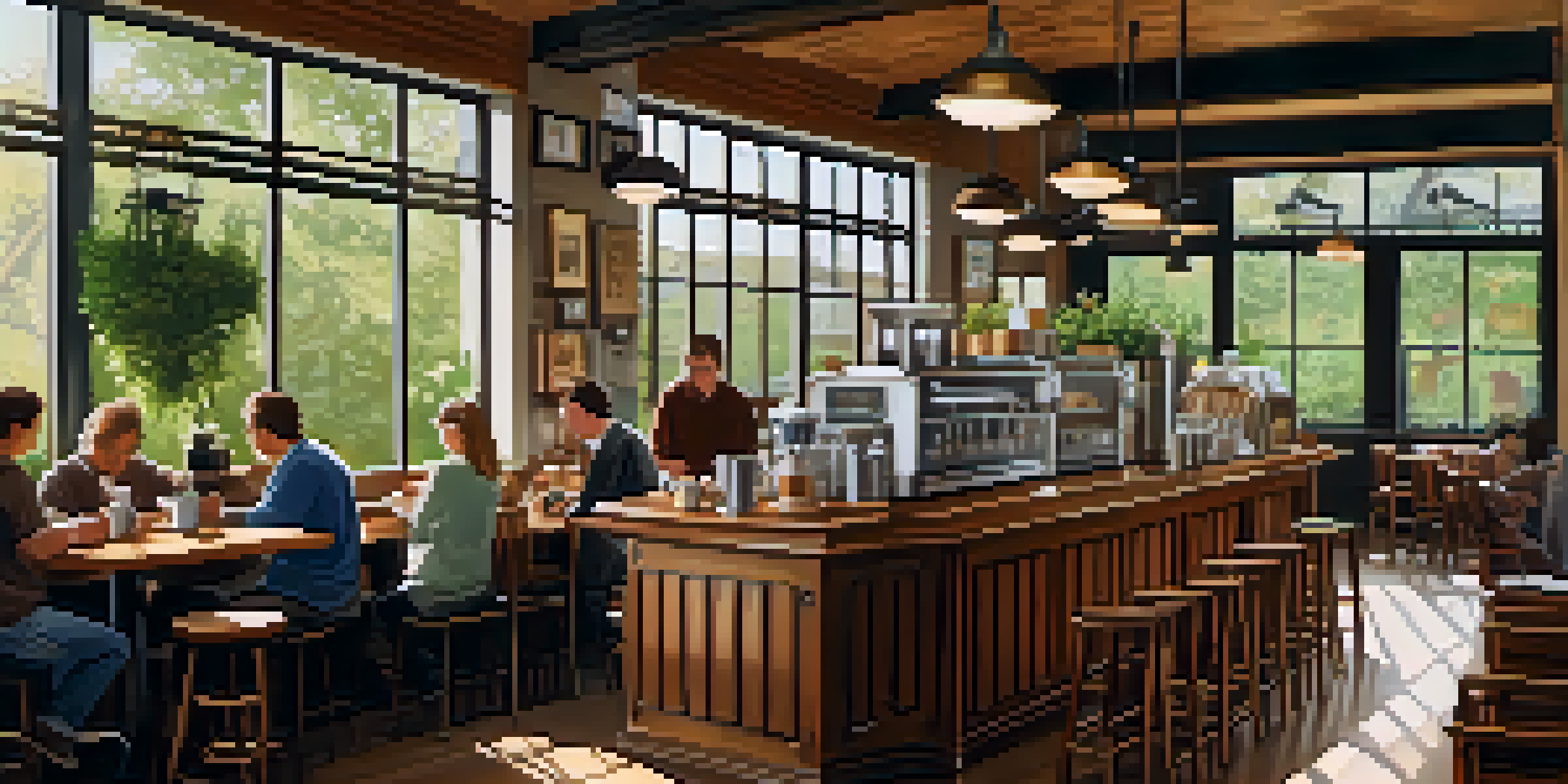The History and Evolution of Gourmet Coffee Culture

The Origins of Coffee: A Historical Overview
Coffee's journey begins in the ancient coffee forests of Ethiopia, where legend has it that a goat herder named Kaldi discovered the energizing effects of coffee cherries. This discovery sparked interest that spread to the Arabian Peninsula, where coffee became a staple of social gatherings and trade. By the 15th century, coffee houses known as qahveh khaneh were flourishing in Persia, creating vibrant spaces for conversation and culture.
Coffee is a language in itself.
As coffee's popularity grew, so did its cultivation and trade. The beans made their way to Europe, where they were initially met with suspicion but soon became a fashionable drink among the elite. By the 17th century, coffee houses had popped up in major cities, serving as hubs for intellectual exchange, much like today’s coffee shops that encourage creativity and collaboration.
These early coffeehouses laid the groundwork for what would become a global coffee culture, influencing everything from social norms to economic structures. The exchange of ideas over a cup of coffee became a catalyst for movements in art, politics, and philosophy, illustrating how a simple beverage could foster profound societal change.
The Birth of Gourmet Coffee: Quality Over Quantity
The concept of gourmet coffee began taking shape in the late 20th century, as consumers started to prioritize quality over mere caffeine intake. This shift was marked by the rise of specialty coffee shops that focused on sourcing high-quality beans and crafting unique blends. These establishments emphasized the importance of brewing techniques, showcasing coffee as an artisanal product rather than just a commodity.

During this time, the term 'third wave coffee' emerged, representing a movement that treats coffee with the same respect as fine wine. This wave emphasizes transparency in sourcing, with baristas often sharing information about the growers, regions, and processing methods of the beans. This educational aspect fosters a deeper appreciation for the complexity of flavors and aromas found in gourmet coffee.
Coffee's Rich Historical Roots
Coffee's journey from Ethiopia to global culture highlights its role in social interactions and intellectual exchange.
As consumers became more discerning, the demand for unique and high-quality coffee experiences grew. This paved the way for innovations such as single-origin brews and pour-over techniques, allowing coffee lovers to explore a diverse range of flavors and profiles, much like tasting different varietals of wine.
Globalization and Its Impact on Coffee Culture
Globalization has played a significant role in shaping gourmet coffee culture, as it facilitated the exchange of coffee varieties and brewing methods across borders. This interconnectedness has led to a rich tapestry of coffee traditions worldwide, from the Italian espresso to the Turkish coffee ritual. Each culture brings its unique flair, contributing to a diverse global coffee landscape.
The powers of a man’s mind are directly proportioned to the quantity of coffee he drinks.
As travel and technology advanced, coffee enthusiasts began to explore international coffee regions, seeking unique flavors and experiences. This exploration has not only broadened the palate of coffee drinkers but also highlighted the importance of ethical sourcing and fair trade practices. Consumers are now more aware of the social and environmental implications of their coffee choices.
The rise of social media has further amplified this cultural exchange, with coffee lovers sharing their experiences, tips, and favorite brews online. This digital platform fosters community and encourages exploration, allowing people to connect through their shared passion for gourmet coffee, regardless of geographic boundaries.
Sustainable Practices in the Coffee Industry
As the appreciation for gourmet coffee has grown, so has the awareness of sustainability within the coffee industry. Consumers are increasingly concerned about the environmental impact of coffee production, prompting a shift towards sustainable practices. Many coffee companies are now prioritizing eco-friendly farming methods, ensuring that their beans are grown without harming the environment.
Sustainable practices not only benefit the planet but also improve the quality of coffee itself. Farmers who use organic methods often produce beans with more complex flavors, appealing to the gourmet market. Additionally, initiatives such as shade-grown coffee promote biodiversity and protect ecosystems, further enhancing the narrative of responsible coffee consumption.
Rise of Sustainable Coffee Practices
Increasing awareness of sustainability is transforming the coffee industry, encouraging eco-friendly methods and ethical sourcing.
The emphasis on sustainability is reshaping consumer behavior, as more people seek out brands that align with their values. This shift is transforming the coffee industry, encouraging transparency and accountability while fostering a deeper connection between consumers, producers, and the planet.
The Role of Technology in Coffee Brewing
Technology has revolutionized the way we brew and enjoy coffee, making it more accessible and enjoyable for everyone. From single-serve machines to precision grinders, innovations have empowered home brewers to replicate café-quality coffee in their kitchens. These advancements have made it easier for enthusiasts to experiment with different brewing methods and flavors.
Smart coffee makers and apps now allow users to control brewing parameters such as temperature and extraction time, resulting in a more personalized coffee experience. This level of customization caters to individual preferences, making gourmet coffee more approachable for casual drinkers and connoisseurs alike. It’s like having a personal barista at home!
Moreover, the rise of online resources and communities enables coffee lovers to share their brewing techniques and experiences, fostering a culture of learning and experimentation. This technological integration not only enhances the enjoyment of coffee but also encourages a deeper connection with the craft of brewing.
Exploring Coffee Pairings: A Culinary Adventure
Gourmet coffee culture has expanded beyond just the beverage itself; it has become a culinary adventure that explores food pairings. Just as wine complements a meal, coffee can enhance flavors and elevate dining experiences. Coffee tasting events often feature curated pairings, inviting enthusiasts to discover the harmonious relationship between coffee and various foods.
The versatility of coffee allows it to pair beautifully with a wide range of dishes, from sweet pastries to savory meats. For example, a rich and bold coffee can enhance the flavors of dark chocolate, while a light and fruity brew may complement a citrus dessert. This exploration adds another layer of enjoyment to the coffee experience, encouraging experimentation and creativity.
Technology Enhances Coffee Brewing
Innovations in brewing technology are making gourmet coffee more accessible and customizable for all enthusiasts.
As gourmet coffee continues to evolve, the culinary world is embracing this trend, leading to innovative recipes and unique flavor combinations. Chefs and baristas alike are collaborating to create unforgettable tasting menus that highlight the intricate relationship between food and coffee, making every sip a delightful experience.
The Future of Gourmet Coffee Culture
Looking ahead, the future of gourmet coffee culture appears bright, with ongoing innovations and trends shaping the landscape. As consumers become more educated about their coffee choices, we can expect a continued emphasis on quality, sustainability, and ethical sourcing. This focus will likely drive the industry towards even more responsible practices and transparency.
Moreover, the rise of specialty coffee shops and roasters will continue to foster community engagement and appreciation for the craft of coffee. These spaces will not only serve as venues for enjoying gourmet coffee but also as platforms for education and collaboration, connecting people through their shared passion.

As technology advances and new flavor profiles emerge, coffee culture will remain dynamic and evolving. Whether through innovative brewing techniques, sustainability efforts, or exciting culinary pairings, the journey of gourmet coffee is far from over, inviting everyone to join in on the adventure.